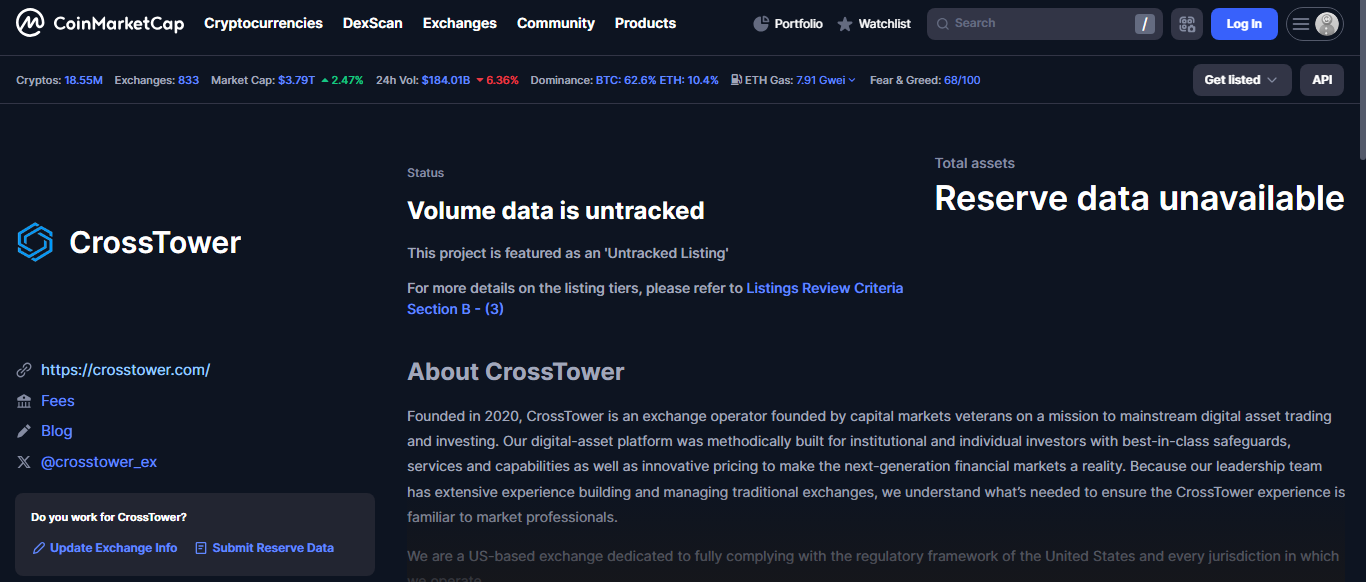CrossTower review - regulation-driven exchange with low retail pull

CrossTower started in 2019 with headquarters in the US and India, positioning itself as a crypto trading platform built for compliance-heavy institutions. Unlike many flashy retail-first exchanges, CrossTower emphasizes regulatory alignment, licensing and institutional-grade custody. That serious approach has won it a few partners - but also left it with modest trading volume and limited traction among everyday traders.
Platform features and trading products
CrossTower offers spot crypto trading and some over-the-counter services. It supports a handful of major assets like BTC, ETH and a few stablecoins. The platform design is simple, clean, tailored for professional interfaces, with quick order routing and API access for larger clients.
There’s no derivatives or high-leverage margin trading. Instead, CrossTower highlights features like segregated custody accounts, insurance coverage for digital assets, and integration with compliance tools. This clearly targets funds, wealth managers and corporate treasuries more than day traders.
Trading volume and liquidity footprint
While CrossTower claims multi-jurisdiction registrations and showcases compliance frameworks, its reported daily trading volume is small - often under a million dollars. That’s a fraction of leading retail exchanges. Order books tend to be thin, with larger trades causing noticeable price shifts. For serious institutional clients that can still work if orders are carefully structured, but for retail traders seeking deep liquidity, it’s a limitation.
Regulation and security posture
This is where CrossTower puts most of its marketing muscle. It’s registered as a Money Service Business (MSB) in the US, has VASP licensing in Europe and partners with licensed custodians. The exchange also touts insurance coverage for held assets and regular compliance audits. Security stack includes multi-signature wallets and strict internal access controls.
However, there’s no widely published third-party penetration test data. While licensing beats offshore unregulated exchanges, ultimate asset safety still depends on internal controls and counterparty risk with custodian partners.
User interface and customer experience
The platform is minimalistic. Traders can deposit, withdraw and execute market or limit orders easily, but there’s no advanced charting, NFT market, staking or yield products. For institutions and treasury desks, this uncluttered design is a plus. For casual crypto enthusiasts looking for broad DeFi integrations or passive income tools, it feels sparse.
Customer support is mainly email and corporate relationship managers. For retail users, reviews indicate response times are average - not outstanding, but not ignored either.
Pros & cons
Pros
- Strong compliance focus, multiple jurisdictions covered
- Insurance-backed custody with licensed partners
- Minimalistic, efficient trading interface for direct spot buying
- API and OTC desks suited for larger orders
Cons
- Very low daily trading volume limits liquidity
- No derivatives, margin, staking or advanced DeFi products
- Thin retail community and little social engagement
- Heavily reliant on traditional custodial partners without on-chain transparency
Final verdict - niche institutional player
CrossTower does what it promises: delivers a regulatory-heavy, secure spot trading environment mainly designed for institutions and high-compliance clients. It’s not trying to be Binance, Coinbase or a bustling retail hub.
If you’re a fund or corporate treasury needing direct spot access with solid paperwork trails, CrossTower is a fit. For retail traders chasing altcoin rotations, staking yields or deep futures liquidity, it offers little appeal. In that sense, it’s a focused platform serving a narrow slice of the crypto market.
Disclaimer
“This content is for informational purposes only and does not constitute financial advice. Please do your own research before investing.”
.png)







%203.svg)
%203.svg)




















